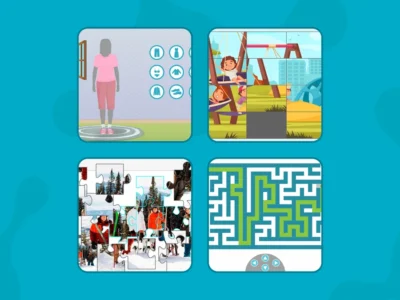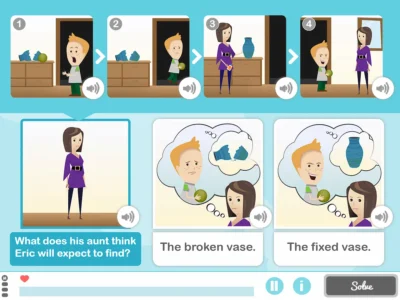Sara Puig Pérez, Vice Dean at the Faculty of Health Sciences of the International University of Valencia (VIU), and Marta Aliño Costa, director of the University Master’s Degree in Clinical Neuropsychology, share how they understand technological innovation in university curricula and how they have implemented NeuronUP in the academic training of the professionals of the future.
Introduction: digital transformation in the university
University education is going through a period of accelerated transformation. Digitization, the need for more practical methodologies and the demand to prepare students for an increasingly competitive job market force universities to rethink their educational models.
In this context, some institutions are taking decisive steps toward innovation. One of them is the International University of Valencia (VIU), which stands out as a benchmark by integrating technological innovation into its programs, especially in the area of health and neuropsychology.
International University of Valencia (VIU)
VIU was founded in 2008 as a digital native university, with the mission of making high-quality, flexible and innovative university education accessible. Since then, and thanks to its adaptation to technological changes, its international vision and the constant updating of content, it has become one of the main online universities in the Spanish-speaking sphere.
Currently, with more than 25,000 students from 87 nationalities spread across 86 different countries, and with a faculty made up of 2,900 teachers, it has consolidated itself as a benchmark in online higher education.
Committed to excellence, VIU offers 100% online education, based on academic excellence, technological innovation and a human touch, through a virtual campus awarded internationally. This educational model allows students to learn from anywhere, at their own pace, with continuous support from tutors and professors.
Technological innovation in university education in health and neuropsychology
Universities can no longer limit themselves to transmitting theory. Higher education is undergoing full digital transformation, and technological innovation has established itself as a key pillar in the training of future health and neuropsychology professionals.
Far from limiting themselves to the transmission of content, leading universities are opting to integrate platforms, simulators and virtual environments that allow for more practical, personalized learning connected with clinical reality.
One example of this commitment is the International University of Valencia (VIU), which has anticipated the needs of digital education and become a benchmark in the socio-health field. As both academic leaders Press Conferencedas point out, “technology enables a more personalized, accessible and connected form of training with the academic as well as the professional world”.
NeuronUP: key tool in university cognitive stimulation
Digital tools like NeuronUP allow progress along this path, facilitating the practice of cognitive stimulation in a digital environment. This innovation allows students to arrive better prepared for their external placements and to gain experience in the use of resources that are currently employed in real clinical contexts.
In the field of psychology, Sara Puig and Marta Aliño highlight that “the use of platforms like NeuronUP promotes the development of practical competencies from early stages of training, which means that, at the time of entering clinical placements, our students already have practical experience in using intervention tools like NeuronUP”.
The commitment to innovation not only improves the quality of teaching, but also strengthens the institution’s image and reputation. “The incorporation of advanced technology conveys an image of modernity and commitment to the future. At the same time, it has a positive impact on the perception of quality and reinforces academic leadership”, they describe.
Access Right Now to the full Press Conference of the International University of Valencia (VIU)
- How the university has integrated digital tools into a 100% online model.
- The role of NeuronUP as a bridge between theory and practice.
- The benefits already perceived in students’ motivation and preparation.
- The challenges and opportunities that technological innovation brings to university teaching.
- Vision of the future: artificial intelligence, augmented reality and immersive classrooms.
Conclusion
In short, technological innovation in university education is not only a trend, but also represents a strategic necessity. Initiatives like VIU’s show how digitization and the use of cutting-edge tools are able to transform the teaching of neuropsychology and prepare the professionals of the future with a differential advantage.
Frequently asked questions about technological innovation in university education
1. Why is technological innovation important in today’s university education?
Technological innovation enables more personalized, accessible training that is connected with the professional world. In addition, it ensures that students acquire practical competencies that improve their preparation and adaptability to real clinical contexts.
2. What challenges does the incorporation of technology into university education pose?
The biggest challenge of incorporating technology into university education is maintaining continuous training for teaching staff to ensure an effective and up-to-date pedagogical use of digital tools.
3. What role does NeuronUP play in neuropsychology training?
NeuronUP is a digital cognitive stimulation platform that allows students to train cognitive functions and design intervention programs from early stages of their training, simulating real clinical scenarios.
4. How does working with technologies used in clinical practice benefit students?
Working with technologies used daily in clinical practice allows students to acquire prior experience, as well as greater security and confidence in carrying out their external placements, in addition to a more competitive professional profile in the job market.
5. What is the future of digital university education?
Trends point to the use of artificial intelligence, augmented reality, clinical simulators and immersive virtual classrooms that will further close the gap between theory and practice.
Request a meeting with our team
Find out how NeuronUP can optimize the prestige and academic offer of your university with its innovative resources. Complete the form and our team will advise you without obligation.
If you liked this article about how the International University of Valencia (VIU) innovates in university training in cognitive stimulation with NeuronUP, you will surely be interested in these NeuronUP articles:
“This article has been translated. Link to the original article in Spanish:”
Cómo la Universidad Internacional de Valencia (VIU) innova en la formación universitaria en estimulación cognitiva con NeuronUP







 Digital transformation of neurological therapies in the UEN thanks to NeuronUP
Digital transformation of neurological therapies in the UEN thanks to NeuronUP
Leave a Reply